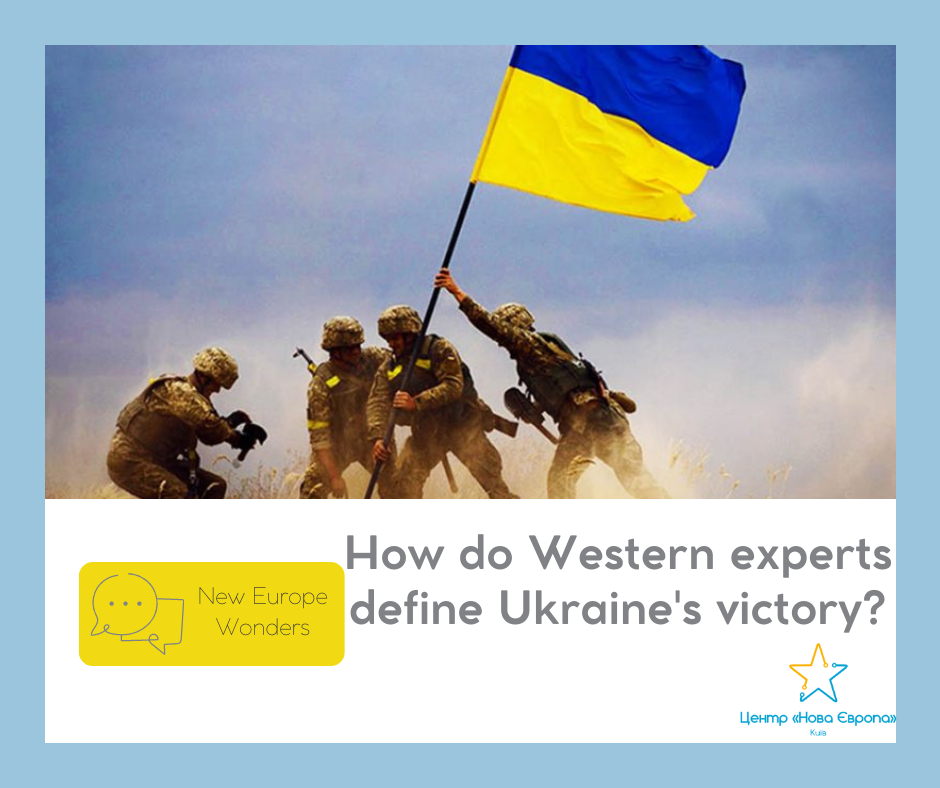
Almost three months of heroic Ukrainian resistance have shown that Russia’s idea of blitzkrieg in Ukraine failed. Moreover, both Ukrainian and Western politicians state that Ukraine will win the war with Russia. Yet, the vision of Ukraine’s victory is rather vague. EU diplomacy chief Josep Borrell, for instance, recently stated that Ukraine’s victory in the war with Russia would be the ability to “reject the invader out of their borders”. And EU defense ministers during a meeting of the EU’s Foreign Affairs Council agreed that the only acceptable war ending would be restoration of Ukraine’s territorial integrity within the 1991 borders. Therefore, within the traditional rubric “New Europe Wonders…” we addressed leading European and American experts with the following question: “How would you define the victory of Ukraine?”.
Our expert poll has shown that the perception of the end of the war has changed among Western experts over the past three months: at first few people believed in the success of Ukraine, but today an increasing number of experts predict a military victory for our country. There is an opinion that Ukrainians have to seize the information initiative and communicate properly: Ukraine has already won, because it managed to disrupt blitzkrieg and put up a proper resistance to Russian invaders.
In general, experts agree regarding the following:
- It is Ukraine, who should determine the goals of the war, and Western states are to accept this vision;
- Ukraine’s victory is not only securing the territory, pushing the occupiers out of the country, but also eliminating the threat of Russian aggression in the future;
- True victory for Ukraine is the postwar reconstruction and successful modernization, comprehensive implementation of reforms, which would lead to Ukraine’s full-fledged integration to the EU.
PDF-version of the paper is available here.
James Sherr, Senior Fellow, Estonian Foreign Policy Institute at the International Centre for Defence and Security (Estonia); Associate Fellow, Russia & Eurasia Programme, Chatham House (United Kingdom)
Without clarity, without clear objectives, there can be no victory. Today, the threat to Ukraine’s survival comes from Russia. But the threat to its singularity of purpose comes from the West. Some of the West’s most influential policy-makers are still wedded to ‘crisis management’. Others recognise that the West is a protagonist — albeit not a belligerent — in a war for Ukraine’s survival. If you believe in crisis management, then Russia cannot be defeated without its consent. But if you believe there is a war for survival, then you also believe, in the words of the late Sir Michael Howard, that ‘there is really an enemy’. So long as Russia regards Ukraine as a part of its own identity, and the Helsinki-based order with contempt, it will be our common enemy.
It stands to reason that final victory must mean the elimination of the threat that Russia poses. But realities dictate shorter-term and more tangible objectives as well. The immediate military objective must be the expulsion of Russian forces to the lines they occupied before 24 February. Not once during Putin’s tenure in office has ‘temporarily occupied’ territory been relinquished. Those who call for an ‘immediate cease-fire’ have not learnt from this experience.
The longer-term political objective must be the restoration of Ukraine’s internationally recognised borders, the restoration of its sovereignty, the repatriation those who have been deported and the restitution of property and losses.
As long as Ukrainians believe that the costs of achieving these aims will be less horrendous than the costs of not achieving them, the West has no right to persuade them otherwise.
Michael Kimmage, Head of history department, US Catholic University; Visiting Fellow, German Marshall Fund (USA)
Victory for Ukraine – after Russia’s massive and brutal invasion in February 2022 – will have three elements.
The first resides in Ukraine’s political economy: the need to retain elections and other democratic procedures during wartime and to keep the economy up and running. In this Ukraine can rely on the financial assistance of many European states and of the international community.
The other two elements of victory will be military. A negotiated settlement to the crisis on terms acceptable to Kyiv is unlikely. Instead, Ukraine should try to build on its already significant military successes around Kyiv and Kharkiv. It is impossible to predict exactly how much territory Ukraine will regain this summer, the Russian campaign having exhausted itself and there being now a window of precious opportunity. The goal obviously will be to push the Russian army as far off of Ukrainian soil as possible – and at a minimum to secure all Ukrainian territory West of the Dnieper River.
Finally, Ukraine will have to array its forces, bolstered by the extensive support of the United States and its allies and partners, in such a way as to pin down the Russian troops that will remain on Ukrainian soil (even if only in their pre-February 24 configurations) and to deter future Russian invasions from the North, the South and the East.
Roland Freudenstein, Vice President, GLOBSEC (Belgium)
There is a short and a long answer to this question. The short one consists of a handful of points: Total withdrawal of Russian forces from Ukrainian territory (i.e. including all of Crimea and Donbass), return of deported persons, Russian reparations for damages, full persecution of war crimes.
The long answer takes into account the question to what extent this is achievable. A few weeks ago, most experts even in Ukraine would have estimated such an outcome rather improbable because militarily, a long stalemate in the Donbass, with a negotiated compromise at the end, was the most popular prediction. Now, part of Western punditry has moved on to predicting the strong possibility of a military victory by Ukraine – which at least in theory entails the possibility of an agreement between Ukraine and Russia that covers most of the points above. I personally share that view.
In a recent twist of the debate, some West European leaders now demand an ‘off-ramp’ for Putin because he should not be ‘humiliated’. According to those voices, even if Ukraine wins, it should grant Russia some territorial gains. This is obviously driven by fears of a nuclear escalation, or a collapse of the Russian Federation in case of an obvious defeat on the battlefield and then the negotiating table. Those leaders apparently have fallen victim to Kremlin propaganda, and cannot get rid of the appeasement reflex which has brought Ukraine, and the whole of Europe, into the current situation. Thank God the G-7 have just reiterated their full support for ‘Ukraine’s sovereignty and territorial integrity’. Its restoration should be the decisive yardstick for the victory not only of Ukraine, but the whole of Europe.
David Satter, Senior Fellow, Hudson Institute (USA)
Victory for Ukraine means the securing of the national territory and the removal of the threat of further Russian aggression. Anything less is only a partial victory and, possibly, no victory at all.
Of the two objectives, the removal of the threat of further aggression may be easier to achieve. Russia has learned the limits of its use of force and has already scaled back its objectives. In five, ten or twenty years, it is likely to be weaker rather than stronger. Justice, however, demands that Russia not benefit in any way from eight years of aggression against sovereign Ukraine. Achieving this, however, could come only at the cost of thousands of additional Ukrainian lives. Victory therefore may come in two stages: the destruction of Russia’s ability to threaten Ukraine in the first stage and the achievement of justice in the second with the use of military and non-military means, such as international sanctions, changing the situation in the long term. If both objectives are achieved in the long term, it would be an imperfect result. But it would still be a victory.
Gustav C. Gressel, Senior Policy Fellow, European Council on Foreign Relations (ECFR) (Germany)
Russia’s Donbas offensive running into difficulties, issues of bad morale and insufficient volunteers for Moscow’s war of aggression may suggest the tide of military fortunes may turn soon. And then, how far would Ukraine’s counter-offensive go? Would Moscow then be willing to enter into meaningful negotiations about a ceasefire or even peace? And even then, which terms and conditions should Ukraine accept? Discussions and speculations about the matter are hard to stop.
To be frank, none of that is the West’s business. Ukraine is fighting for its survival. The alternative to victory is extermination. Ukrainian servicemen, not German, French, or American stand on the front line. Ukrainian civilians suffer the most from occupation. Ukraine has a legitimate, democratically elected government. It is this government’s task to define the war aims, and at the given point, decide under which conditions they would accept what kind of settlement.
True, in the German domestic discussion, the call for an immediate ceasefire – that would quasi-perpetuate Russian occupation – often flares up. And some parts of Berlin’s intellectual and political elites seem to be uneasy with the fact that Russia may lose a war – for whatever reason. But is any of that relevant? No. In fact, one of the few things Olaf Scholz got right at this point is to stay clear of any suggestions for an end-state of this war, knowing that first, a lot may still happen, and second, this is a matter Ukrainians need to decide for themselves. And it should remain that way.
Mathieu Boulègue, Senior Research Fellow, Russia and Eurasia Programme, Chatham House (United Kingdom)
Victory for Ukraine, in broad strategic terms, would mean the complete withdrawal of Russian troops from military positions pre-2014. Namely, a free Ukraine from Russian troops not only from 2022 positions but also from occupied Crimea and Donbas. Which, unfortunately, is not going to happen in the short term.
In which case, ‘victory’ needs to be defined in tactical-operational terms. At this stage of the war, I would argue that ‘victory’ is a mental and informational space that must be crowded and occupied by Ukraine and its allies. Basically, victory is what we decide it is. Regardless of Russian propaganda, Kyiv needs to seize the initiative in terms of information dominance that Ukraine is, indeed, ‘winning’ the war and that Russia must lose.
For instance, the fact that the Kremlin has not managed to break and subdue Ukraine – in itself, this is a form of victory, as Ukraine still stands and fights back. Or that regardless of Russian war plans to withdraw from certain parts of Ukrainian territory (notably around Kharkiv), Ukrainian counter-offensives there and elsewhere are achieving genuine tactical effects and complicating Moscow’s decisions. Or the fact that Kyiv can now count on continued and unwavering assistance from its allies.
Melinda Haring, Deputy Director of the Eurasia Center, Atlantic Council (USA)
Defining victory in Ukraine is tricky for political reasons. Victory now includes retaking the Donbas and Crimea and defeating Russia to the extent that it cannot attack its neighbors ever again. Victory includes Moscow paying Ukraine for the damages it has caused since 2014 plus facing accountability for the war crimes its soldiers have inflicted on Ukrainians. With Western help, Ukraine should be able to retake most of Ukraine by the year’s end but retaking Crimea is another story. It’s entirely possible that the madman in the Kremlin may use a nuclear weapon if Ukraine were to try to retake Crimea. As a result of the horrors of the war and especially Russia’s war crimes in Bucha and beyond, it is unacceptable to surrender any of Ukraine’s territory. The key point is that Ukraine’s victory must come quickly. Time is not on Ukraine’s side. The longer the war lasts, the more likely it will become a war of attrition, which favors Moscow.
Dr. Florent Parmentier, Secretary General, Center of political researches of Sciences Po (CEVIPOF) (France)
The question is twofold: what would be a military victory of Ukraine, and what would be a political victory of Ukraine?
On the military side, it depends on what are the key objectives: going to the ante-24th February situation? Regaining the Donbas? Taking back control over Crimea? While regaining the Donbas is a credible goal today, taking back the Crimean Peninsula would probably mean escalating to a new level, where nuclear deterrence would not work.
A political victory would mean bringing Ukraine to Europe under specific conditions (economic reconstruction, bringing back the refugees, risks of trafficking of weapons, etc.). President Macron’s proposal of the ‘European political community’ helps to bridge the gap between the impossibility of a quick enlargement (as seen in Central Europe and the Balkans today) and the necessity of immediate action (the political and differentiated integration of Ukraine, but also Moldova, Georgia, and the Balkans States). While economic integration would take time, this initiative would send a clear message of political support to Ukraine.
Wojciech Konończuk, Deputy Director, Centre for Eastern Studies (Poland)
The victory would mean that Ukraine successfully defends its sovereignty and restores control over the lost territories. Russia’s defeat is a matter of time, although it has and will have very high costs for the Ukrainians. This war is a watershed moment for Ukraine and the rest of Europe as it finally ends the post-Cold war period and opens a new political epoch. The new European order is being born in Ukraine due to Russian aggression. To take advantage from it, the Ukrainian victory must happen not only on the battlefield but an indispensable part of it should be a restart of the country. When winning the war, Ukraine should also catch the new opportunities for modernization, build a new economy, and develop a better functioning state and equal society. This will be a considerable challenge, but Ukraine’s return to Europe would not be completed without it.
Richard Gowan, UN Director, International Crisis Group (USA)
There is no single Western view of what a Ukrainian victory in the war with Russia would look like. The U.S. and Europeans are happy to see Ukraine regaining territory and the Russian offensive in Donbas losing momentum. But looking ahead three factors will come into play.
The first is that Western powers will want to avoid any scenario in which Russia responds to repeated military setbacks by escalating the war, potentially raising the spectre of nuclear use. NATO countries have increased the volume and sophistication of weaponry they are providing to Ukraine. Yet the alliance’s most powerful member, the U.S., has steered away from actions – such as imposing a no-fly zone – that it fears could lead to a direct NATO-Russian confrontation. Western governments say that they defer to Kyiv to define what would be an acceptable end to the war, but it is safe to assume that they will want to avoid options that would involve expanding hostilities to directly involve NATO states and NATO assets.
Secondly, if and when a peace deal becomes possible, that will only be one step in the direction of trying to re-establish regional stability. NATO members will worry that Russia may simply agree to a peace deal in the short-term and then start planning for another – potentially more brutal – assault on Ukraine or another neighbor in a few years’ time. For its part, Russia will worry about maintaining its regional position in the face of a Western alliance that (assuming that Sweden and Finland accession requests are granted) will have grown and become more cohesive as a result of the war. NATO and the EU are of course strengthening their defenses in anticipation of future Russian challenges. But the U.S. and Europeans will also want to reopen discussions with Moscow at some stage about European security, arms control and strategic stability in an effort to avoid further confrontations.
Finally, European governments in particular will want to ensure that Ukraine recovers economically as quickly as possible. The EU and organizations like the World Bank will doubtless offer Ukraine large sums of post-war aid. But their budgets are not limitless, and Ukraine’s allies will want to see Kyiv raising its own revenues – not least through agricultural exports – as quickly as possible, in addition creating positive conditions for refugee return.

















